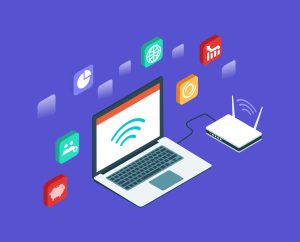Introduction to Online Learning for Students
We want to prepare you to make the most of your online interactions with staff and students here at QMUL. As with other forms of online communication, when taking part in online sessions we need to treat each other with the same respect and care as we would in a face-to-face setting.
With much of your teaching taking place online, it’s important that you prepare well beforehand in order to get the optimal experience online.
During the lesson it is vital that students are contributing to, and feel part of a safe, respectful and connected QMUL community when interacting online.
This guide covers:
Netiquette

With much of your teaching taking place online, it’s important that you are contributing to, and feel part of a safe, respectful and connected QMUL community when interacting online.
‘Netiquette’ (a portmanteau of ‘net + etiquette’) is a term used to refer to the standards expected of you when participating in online communities. In order to maintain a positive, constructive, online learning environment, there are mutual expectations of staff and students here at QMUL.
While in a classroom environment it can be relatively straightforward to respond to non-verbal cues from teaching staff and fellow learners, online will require slightly different skills and self-monitoring techniques. Not all online sessions will require you to frequently interact with peers and teaching staff, but sometimes it will be necessary to take part in order to get the most from a class or seminar. The following is a (non-exhaustive) list of some things you can consider in order that both you, your peers, and teaching staff can better enjoy the experience:
- Find a clean, quiet space as free from background noise and potential interruptions as possible. If you live with other people, let them know you have class and ask not to be disturbed.
- Turn off or mute your mobile devices and eliminate all unnecessary distractions.
- Pay attention to the instructions for the session. Different tutors will have different requirements regarding, for example; asking questions, sharing documents, sharing screens, private chat etc.
- Make use of the chat function to ask questions. If you’re not comfortable with speaking and/or being recorded, this can be a great way to participate in sessions. You can also use it if you want to let tutors or other students know why you might not be participating so much – this way others can respond appropriately.
- Where appropriate, use your camera. This can be a good way to demonstrate your engagement in a session and gives others some non-verbal cues. This will, of course, depend on the session (and your connection) but it can help to establish rapport if you are able to use it – even just for a moment or two to greet other participants. And don’t forget to be aware of what’s in your background when using it!
- Get in the habit of muting your microphone when not speaking in order to keep background noise to a minimum (but don’t forget to unmute it when you do speak!)
- If you wish to speak, most apps (e.g. Zoom, Teams, Blackboard) allow you to ‘raise your hand’ or similar when you want to do so – take a moment to learn how this feature works on each platform.
- If multiple people attempt to talk at the same time then try to take your turn to talk; give others their space, too. This happens often in online sessions but need not be an issue if everyone behaves respectfully.
The more you participate, the more feedback you will receive on your own contributions. The more feedback you receive, the more involved in the session and, more broadly, the University community you will feel – and the better prepared for your assessments!
Your connection and hardware

Where possible connect your device(s) to a strong, stable Wi-Fi connection and be aware that, if you are using your mobile data plan, not only is the connection likely to be considerably slower, but you may also end up incurring extra charges; especially when streaming multimedia or accessing live sessions. A wired LAN connection will provide an even better connection.
Another thing to be conscious of is clearing away all unnecessary distractions; for example, closing any previously open windows/tabs, apps and other services. Not only will this help you to focus entirely on the session but it will also prevent other services from limiting available bandwidth.
It can also be useful before the start of each day to restart your system, thus ensuring that your computer’s resources are cleared and dedicated solely to the tasks at hand. Be sure also to update all browsers and other apps; as well as being general good practice, this can often resolve common issues with connectivity, playback and other irritations.
Check in advance that all your accessories such as headphones, microphone, webcam and anything else that you might need are working well and take a moment to learn where these settings are in the platform(s) you are using – including how to mute and unmute yourself.
Getting the optimal experience online
To ensure optimal learning experience it is vital to reduce the risk of potential technical issues. The following recommendations should be followed to allow a technical issue free experience:
- Ensure a reliable internet connection – not mobile data due to unreliability and cost
- Use up-to-date versions of Chrome or Firefox browser for stability
- Become familiar with online teaching tools such as BB Collaborate, MS Teams and Zoom by reading the guidance materials on the E-Learning website which can be found here
Did this answer your query? If not, you can raise a ticket on the online Helpdesk or email: its-helpdesk@qmul.ac.uk . Alternatively you can also request a particular guide or highlight an error in this guide using our guides request tracker.
Produced by the the Technology Enhanced Learning Team at Queen Mary University of London.



